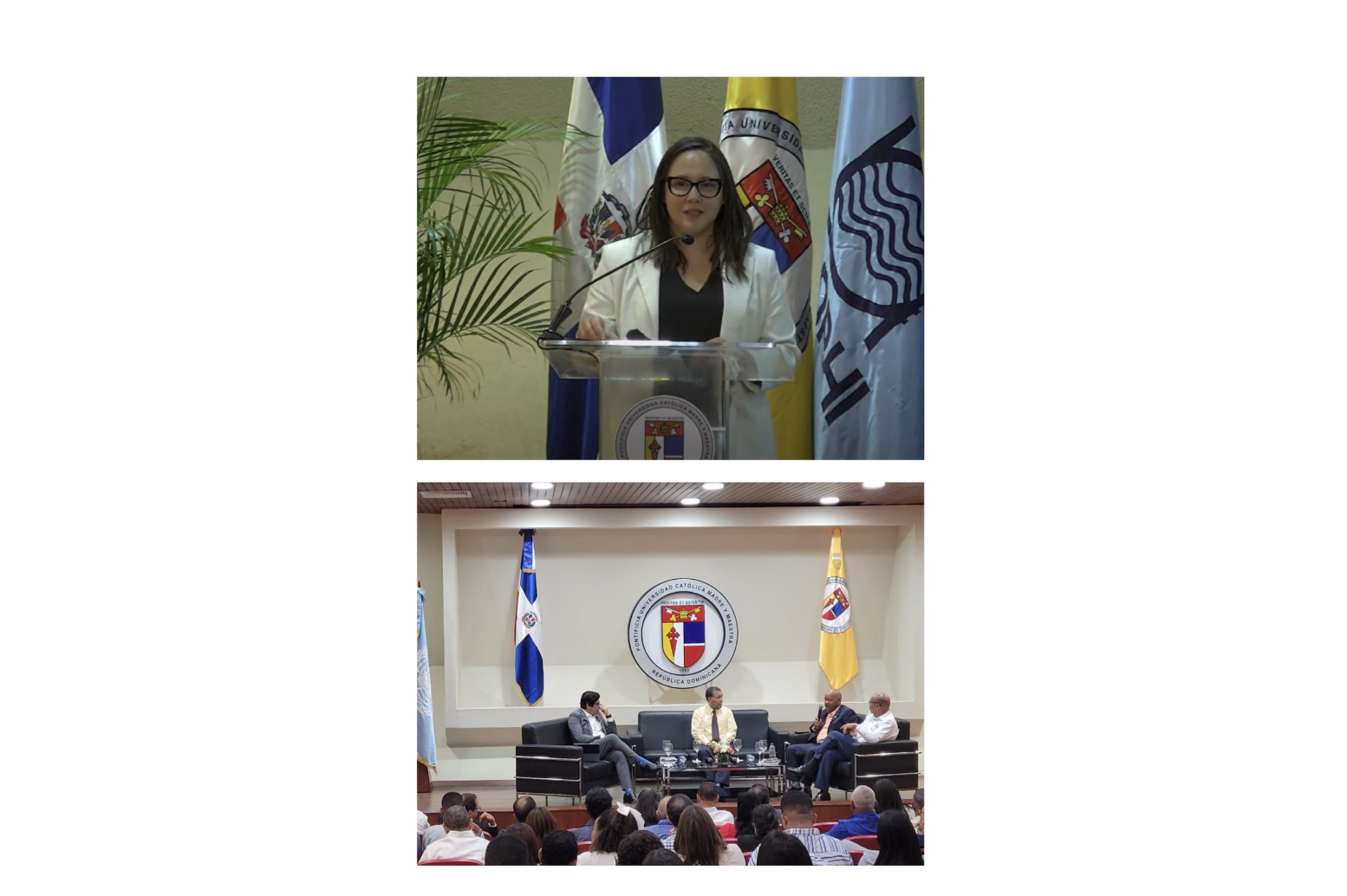High-Level Dialogue on World Water Day 2025: Water as a Pillar of Development
Work area(s)
Topic(s)
To commemorate World Water Day 2025, a high-level event was held at the Pontificia Universidad Católica Madre y Maestra (PUCMM) in Santo Domingo, Dominican Republic, bringing together more than 200 participants, including government representatives, academics, international organizations, and key stakeholders from the water sector. This event, organized by ECLAC and various national institutions, provided a space for in-depth reflection on the challenges and opportunities for sustainable water management in the Dominican Republic and Latin America and the Caribbean.

The event began with welcome remarks from national authorities, officials from ECLAC and the United Nations System in the Dominican Republic, including Ms. Julia Sánchez, UN Resident Coordinator in the Dominican Republic, and Ms. Rayén Quiroga, Head of the Water and Biodiversity Unit in ECLAC’s Natural Resources Division. Both emphasized the strategic importance of water as a pillar of sustainable development, essential for reducing poverty, ensuring food security, protecting public health, conserving ecosystems, and sustaining the economy. As representatives of the UN System, they stressed the urgency of implementing comprehensive policies that promote inclusive and sustainable water management, involving all sectors to address challenges such as scarcity, pollution, and climate change impacts, in alignment with SDG 6 and the global sustainability agenda.
This was followed by a keynote address titled “Water as a Pillar of Development: Challenges and Opportunities for Sustainable Management,” delivered by Ms. Silvia Saravia Matus, Economic Affairs Officer at ECLAC’s Water and Biodiversity Unit. She outlined the main challenges facing the region in water management and proposed concrete solutions to strengthen more effective, inclusive, and resilient water governance.
Saravia provided a critical overview of the water context in Latin America and the Caribbean, showing that despite having four times more water per capita than the global average, the region faces serious issues of distribution, inequality, infrastructure degradation, low efficiency in resource use, and increasing vulnerability to extreme climate events. Recent examples such as prolonged droughts in Uruguay and Mexico, flooding in Brazil, and water pollution in Costa Rica illustrate the range and severity of these impacts, which affect human health, safety, economic growth, and environmental sustainability.
She also highlighted the high dependence of both traditional and emerging productive sectors on water resources. The keynote emphasized the hidden costs of water use in activities such as digital manufacturing and artificial intelligence, revealing the need to incorporate sustainability criteria in sectors not traditionally associated with high water consumption. For instance, it was noted that producing a single smartphone requires approximately 11,300 liters of water, and that generating a single 100-word AI-generated email may consume half a liter of water.
Beyond diagnosis, ECLAC presented governance strategies and economic instruments aimed at sustainability, with a strong focus on designing sensitive and sustainable water tariffs that reflect all costs associated with the water cycle. It was argued that pricing should serve as a management tool, not merely a cost-recovery mechanism, proposing differentiated tariff schemes based on consumption levels, payment capacity, and usage type. Cases from Costa Rica, Jamaica, Mexico, and Chile were analyzed to illustrate diverse tariff and water management approaches, underlining the need for more equitable and efficient models.
In terms of financing, innovative instruments such as blue bonds, debt-for-nature swaps, and payments for ecosystem services were highlighted as means to mobilize public and private capital for sustainable water projects. One example cited was El Salvador, which allocated over USD 350 million for the conservation of the Lempa River through a debt swap, and Mexico’s issuance of its first blue bond for the water sector, particularly in Cancún.
Regarding institutional and governance dimensions, ECLAC pointed out persistent challenges such as institutional fragmentation, the low political priority of water, and limited regulatory capacity. To address these, it proposed strengthening the technical, operational, political, and foresight (TOPP) capacities of water-related institutions, promoting updated regulatory frameworks, inter-institutional coordination, and long-term planning. The creation of the Water Cabinet in the Dominican Republic was highlighted as a promising example of effective coordination in a historically fragmented sector.
The event concluded with a roundtable discussion featuring representatives from the Ministry of Environment and Natural Resources, the Ministry of Economy and Planning, the Water Cabinet, the National Institute of Hydraulic Resources (INDRHI), and the Santiago Aqueduct and Sewer Corporation (CORAASAN). In this open dialogue, authorities shared their progress, remaining challenges, and concrete commitments to advance public policies that integrate climate resilience, equity in access, and efficient water use. The session reaffirmed the consensus on the urgent need to transform the current water management model in the region.
Finally, the gathering served as an opportunity to highlight water not just as a vital resource, but as a structural axis for sustainable economic and social development. In a context of climate crisis and increasing pressure on natural resources, the World Water Day 2025 event served as a call to collective, cross-sector, and evidence-based action to build more inclusive, resilient, and sustainable water management in the Dominican Republic and throughout the region.
Country(ies)
- Dominican Republic